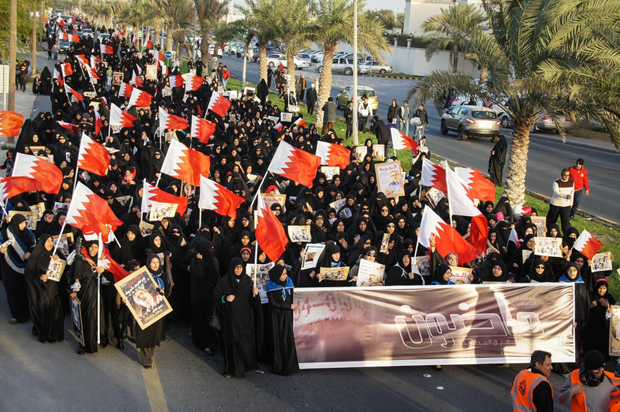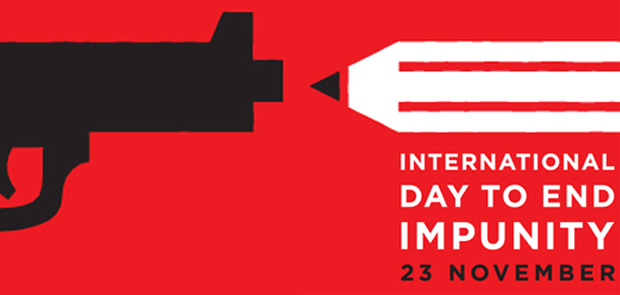21 Jan 2014 | Middle East and North Africa, News

A pro-democracy protest in Bahrain, where activists have been jailed for inciting protests through their online activities (Photo: Moh’d Saeed / Demotix)
One hundred and forty characters are all it takes.
Twitter users from Marrakech to Manama know—call for political reforms, joke about a sensitive topic, or expose government abuse and you could end up in jail. Following the overthrow of Muammar Qaddafi and Zine el-Abidine Ben Ali, authorities in Libya and Tunisia unblocked hundreds of websites and dismantled the state surveillance apparatus. But overall, internet freedom in the region has only declined in the three years since the Arab Spring as authoritarian leaders continue to crack down on any and all threats to their ever-tenuous legitimacy.
As the online world has become a fundamental part of Arab and Iranian societies, leaders are waking up to the “dangers” of social media and placing new restrictions on what can be read or posted online. This shift has been most marked in Bahrain, one of the most digitally-connected countries in the world. After a grassroots opposition group took to the streets to demand democratic reforms, authorities detained dozens of users for Twitter and Facebook posts deemed sympathetic to the cause. Similarly, several prominent activists were jailed on charges of inciting protests, belonging to a terrorist organization, or plotting to overthrow the government through their online activities.
Conditions in Egypt—where social media played a fundamental role in mobilising protesters and documenting police brutality—continued to decline over the past year. In only the first six months of Mohammad Morsi’s term, more citizens were prosecuted for “insulting the office of the president” than under Hosni Mubarak’s entire 30-year reign. Cases have now been brought against the same bloggers and activists that were instrumental in rallying the masses to protest against Mubarak (and later Morsi) in Tahrir Square, while countless others were tortured by Muslim Brotherhood thugs or state security forces.
Even in the moderate kingdoms of Morocco and Jordan, state officials are looking to extend their existing controls over newspapers and TV channels to the sphere of online media. Ali Anouzla, a website editor in Morocco, faces terrorism charges in the latest attempt by the state to silence him and his popular online newspaper, Lakome. Access to independent journalism is even worse in Jordan, where over 200 news sites have been blocked for failing to obtain a press license. The government instituted burdensome requirements in a bid to deter any views that counter the state-sponsored narrative.
If governments are beginning to pay attention, it is because online tools for social mobilisation and individual expression are having a profound impact. Social media accounts were set up for every candidate in Iran’s 2013 presidential elections, despite the fact that Twitter, Facebook, and YouTube are all blocked within the country. In Saudi Arabia – which now boasts the highest Twitter and YouTube usage per capita of any country in the world – social media has been used to promote campaigns for women’s right to drive, to highlight the mistreatment of migrant workers, and to debate sensitive subjects such as child molestation. Citizen journalism was vital in documenting chemical weapons use in Syria, and a new online platform alerts local residents of incoming scud missiles. Nonetheless, Iran, Saudi Arabia, and Syria rank as some of the least free countries in the world in terms of internet freedom according to Freedom House’s Freedom on the Net study.
Remarkably, the country that has made the most positive strides over the past three years, was once among the most repressive online environments in the region – Tunisia. Protest videos from the town of Sidi Bouzid led to an intense crackdown on online dissidents by the Ben Ali regime. Digital activists even enlisted the help of Anonymous, the hacktivist group, to rally international media attention, provide digital security tools, and bring down government websites. Since then, Tunisian authorities have ceased internet censorship, reformed the regulatory environment, and ceded control of the state-owned internet backbone. Tunisia is now the only country in the region to have joined intergovernmental group the Freedom Online Coalition.
So while the snowball effect of social media contributed to the overthrow of several despots, many of the region’s internet users conversely find themselves in more restrictive online environments than in January 2011. Authoritarian governments now know exactly what the face of revolution looks like and, over the past three years, have shown their commitment to counter the internet’s potential to empower citizens and mobilise opposition. Users in liberal democracies may joke about the insignificance of “liking” a post on Facebook or uploading a video to YouTube, but in a region where your social media activity can make you an enemy of the state, 140 characters can lead to serious repercussions.
This article was posted on 21 January 2014 at indexoncensorship.org
22 Nov 2013 | Americas, Asia and Pacific, Azerbaijan News, Europe and Central Asia, News

Tomorrow is International Day To End Impunity. “When someone acts with impunity, it means that their actions have no consequences” explains IFEX, the global freedom of expression network behind the campaign. Since 1992, 600 journalists have been killed with impunity — that is 600 lives taken with all or some of those culpable not being being held responsible. Countless others — writers, activists, musicians — have joined their ranks, simply for exercising their right to freedom of expression.
This year has only added to the grim statistics. By the middle of January, six journalists had already been murdered. We are now getting close to the end of 2013, and 73 more journalists and two media workers have suffered the same fate — 48 in cases directly connected to their work, 25 with motives still unconfirmed. Out of these, 15 were killed without anyone — perpetrators or masterminds — convicted.
Russia is notorious for its culture of impunity. In July this year, Akhmednabi Akhmednabiev, a Russian journalist reporting on human rights violations in the Caucasus, was shot dead. In 2009 he had been placed on an “execution list” on leaflets distributed anonymously, and had in the past also received death threats. In January he survived an assassination attempt which local authorities reportedly refused to investigate. His case is still classed as murder with impunity.
Pakistan is also an increasingly dangerous place to work as a journalist. Twenty seven of the 28 journalists killed in the past 11 years in connection with their work have been killed with impunity. In the last year alone, seven journalists have been murdered. Express Tribune journalist Rana Tanveer told Index he has received death threats and been followed for reporting on minority issues. In October, Karak Times journalists Ayub Khattak was gunned down after filing a report on the drugs trade.
In July, Honduran TV commentator Aníbal Barrow was kidnapped together with his family and a driver. The others were released, but after two weeks, Barrow’s body was found floating in a lagoon. He was the second journalists with links to the country’s president Porfirio Lobo Sosa — they were close friends — to have been killed over the past two years. Four members of the criminal group “Gordo” were detained in connection with the case, but at one point, there were at least three other suspects on the run.
In September, Colombian lawyer and radio host Édison Alberto Molina was shot four times while riding on his motorcycle with his wife. His show “Consultorio Jurídico” (The Law Office), aired on community radio station Puerto Berrío Stereo, and often took on the topic of corruption. The Inter American Press Association in October called on authorities to open “a prompt investigation into the murders” of him and news vendor and occasional stringer José Darío Arenas, who was also killed in September.
Meanwhile in Mexico, a country for many synonymous with impunity for crimes against the media, three journalists were murdered in 2013. The state public prosecutor’s offices has yet to announce any progress in the cases of Daniel Martínez Bazaldúa, Mario Ricardo Chávez Jorge and Alberto López Bello, or disclose whether they are linked to their work. Notorious criminal syndicate Zetas took responsibility for the murder of Martínez Bazaldúa and warned the police about investigating the case. He was a society photographer and student, only 22 at the time of his death. Chavez Jorge, founder of an online newspaper, disappeared in May and his body was found in June, but in August the state attorney’s office said they did not have a record of his death. López Bello was a crime reporter who had published stories on the drugs trade.
This year, 20 journalists — from Naji Asaad in January to Nour al-Din Al-Hafiri in September — have also lost their lives covering the ongoing tragedy of the Syrian civil war. Their loved ones, like those of all the civilians killed, will have to wait for justice.
It is also worth noting that while an unresolved or uninvestigated murder is the most serious and devastating manifestation of impunity, it is not the only one. Across the world, journalists are being attacked and intimidated without consequences. In August there was a two-hour long raid on the home of Sri Lankan editor and columnist Mandana Ismail Abeywickrema, who recently started a journalists’ trade union. Despite her receiving threats related to her work prior to the attack, it was labelled a robbery by the police. Bahraini citizen journalist Mohamed Hassan experienced similar incident, also in August, when he was arrested and his equipment seized during a night-time raid. His lawyer Abdul Aziz Mosa was also detained and his computer confiscated, after tweeting about his client being beaten. In October, a group of Azerbaijani journalists were attacked by a pro-government mob while covering an opposition rally in the town of Sabirabad. One of the journalists, Ramin Deko, told Index of regular threats and intimidation.
International Day To End Impunity is a time to reflect on these staggering figures and the tragic stories behind them. More importantly, however, it represents an opportunity to stand up and demand action. Demand that Russia’s President Vladimir Putin, Mexico’s President Enrique Peña Nieto, Pakistan’s President Mamnoon Hussain and the rest of the world’s leaders provide justice for those murdered. Demand an end to the culture of impunity in which journalists, writers, activists, lawyers, musicians and others can be intimidated, attacked and killed simply for daring to speak truth to power. Visit the campaign website to see how you can take action.
4 Nov 2013 | Bahrain, United Kingdom
Britain is to send the Royal Air Force Red Arrows display team to perform Bahrain, just weeks after negotiations opened on the sale of BAE Eurofighter jets to the tiny Gulf Kingdom.
Bahrain’s ruling family has been engaged in brutal repression of protesters since a democratic uprising began i n February 2011. Britain has been repeatedly criticised for selling weapons and other military hardware to the regime while the crackdown continues.
Earlier today, Index reported the awarding of yet another international prize to the Bahrain Center for Human Rights, which has been battling peacefully for democracy in Bahrain under increasing repression since the uprising. The campaign group won the Norwegian Rafto Human Rights Prize.
Center leader Nabeel Rajab was imprisoned not long after accepting an Index on Censorship Free Expression Award in 2012, and remains in jail.
There have been dozens of violent deaths in Bahrain since the beginning of the uprising, many put down to the regime forces’ indiscriminate use of tear gas, which it is reported to be stockpiling.

A press release published on the Bahrain News Agency Portal today says:
One of the world’s premier aerobatic teams, Britain’s famous Red Arrows, is to display in Bahrain as part of a Middle East tour.
The team, with its nine distinctive red jets, will perform a series of precision formations and dynamic loops and rolls when it visits on Sunday, November 10.
[…]
The Team’s visit to the region has come about after accepting an invitation to the Dubai Air Show, where the Red Arrows will perform each day between November 17 and 21.
It is an opportunity being used by the Team to visit other nations in an important region, with which the United Kingdom has strong links to.
Indeed, Britain’s armed forces have a deep historical tie with Bahrain dating back over 200 years.
As ambassadors for the UK, the Red Arrows showcase the excellence of the Royal Air Force.
The team, which currently fly BAE Systems Hawk aircraft, consists of nine display pilots, all of whom are from frontline squadrons. Each has previously operated other Royal Air Force fast jets, such as the Tornado or the Typhoon multi-role combat aircraft
Bahrain has a great interest in the excellence of British hardware and expertise. As well as looking to buy an “unspecified number of Eurofighter Typhoon fighter jets”, Bahrain already imports hardware including weapons from Britain. Meanwhile, former senior Metropolitan police officer John Yates was engaged to advise the government on policing and dealing with civil unrest.
4 Nov 2013 | Bahrain, Middle East and North Africa, News

Maryam Alkhawaja accepts the Rafto Prize on behalf of the Bahrain Centre for Human Rights (Image: Lind and Lunde/Rafto Foundation)
The Bahrain Center for Human Rights (BCHR) was awarded the Rafto Prize for human rights at a ceremony in Bergen, Norway last night.
BCHR won for its peaceful fight for fundamental rights of freedom of expression and assembly in the Gulf kingdom, the award committee said.
Acting president of BCHR, Maryam Alkhawaja, was in Bergen to accept the prize. President Nabeel Rajab has been imprisoned since July 2012 for criticising authorities on Twitter. Marayam’s father and sister, Abdulhadi and Zainab, prominent human rights defenders in Bahrain, are also jailed for their opposition to the regime.
“The person who should be on this stage is not me but the people on the streets in Bahrain. They are the unnamed heroes,” Alkhawaja said in her acceptance speech.
She also read out a letter from Rajab: “Brutal violations are still continuing today against peaceful Bahrainis while the whole world continues to stay silent, especially Bahrain’s western allies. Our nation is a victim of being in an oil rich region and a victim of hypocrisies and double standards. Unfortunately, dictators of the gulf region succeeded in silencing governments of the free world in return for shortsighted economic and financial gains. Petrodollars have been able to silence global media and prevent them from revealing our people’s sufferings. We hope that with your support we can overcome this thick barrier as it has become so painful for our people to understand why the whole world deserves freedom and democracy except the small nations of oil rich countries in Gulf.”
The award committee echoed these sentiments: “This is a region where abuses too often are met with silence from western governments. Norwegian authorities have done nothing since expressing concerns in 2011,” said committee leader Martin Paulsen.
BCHR was established in 2002. It has played a vital part in Bahrain’s democracy uprising, now in its fourth year, in the face of the regime’s continued crackdown on opposition. BCHR won Index on Censorship’s Advocacy Award in 2012.
The Rafto Prize is awarded by the Norwegian Rafto Foundation. It is an increasingly influential human rights award, and a number of recipients have later gone on to win the Nobel Peace Prize.




